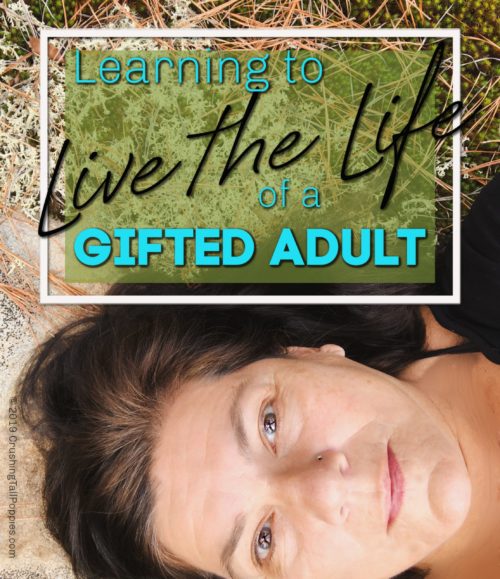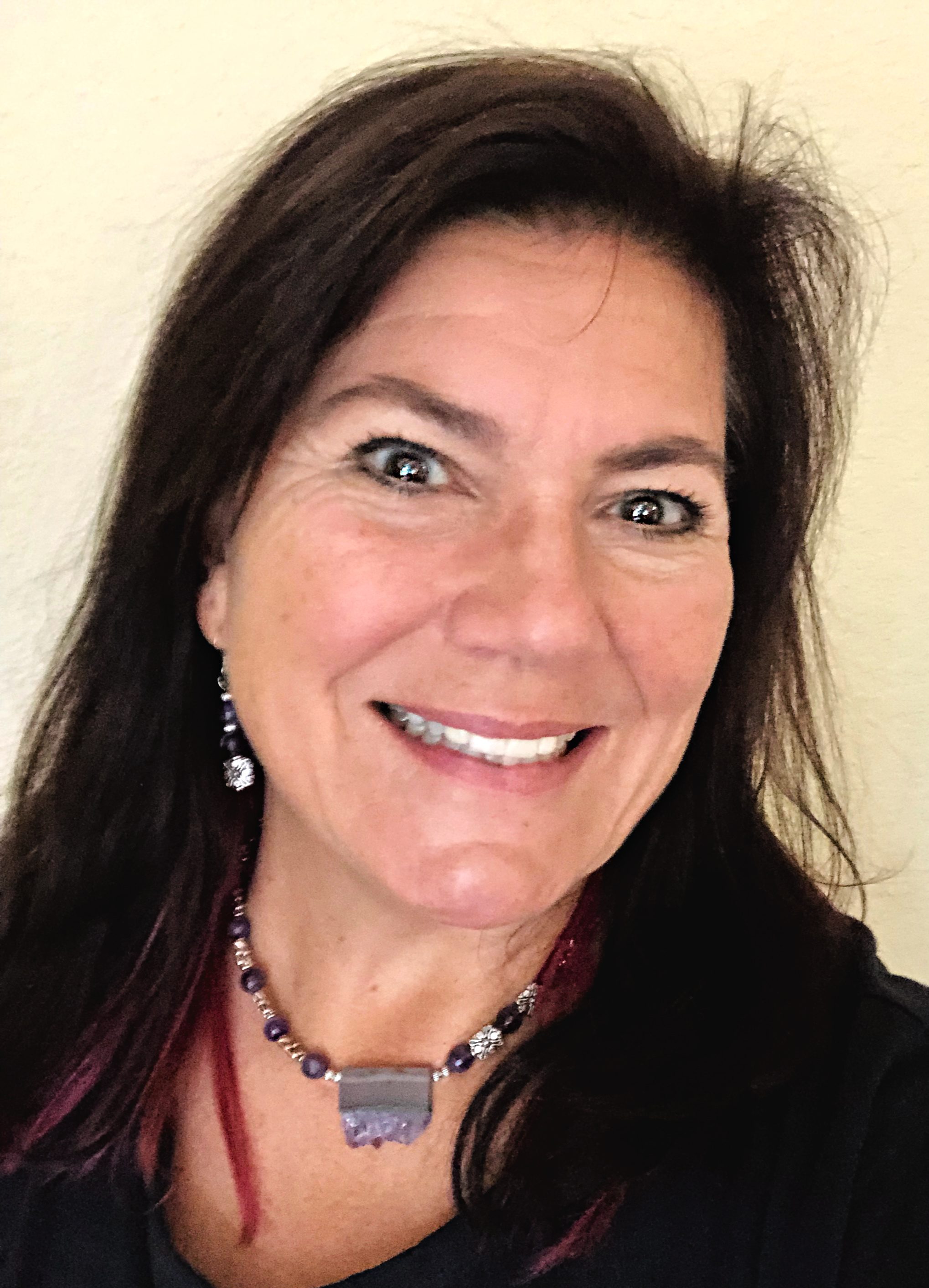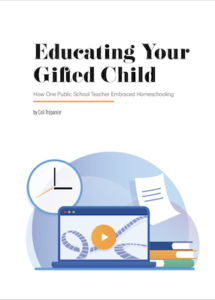Learning to Live the Life of a Gifted Adult

But you’re gifted!
—A statement made with a hollow and misplaced tone of congratulations. The sound of sarcasm and envy, although mostly muted, feels like tiny straight pins whose pointy tips pierce the veil of that positive declaration. Yet, the implicit presumptions of a life of success and future eminence in those three words are utterly transparent. Packed into those three little words, the expectations of a gifted individual are unmistakable; you know this because you are acutely perceptive as many gifted adults are. And the heavy burden of those expectations and presumptions land squarely on your shoulders.
Learning to Live the Life of a Gifted Adult
Until a few years ago, I never self-identified as a gifted individual. I knew I was smart and different—I say different, but I actually considered myself weird, many times in a positive way. I came to realize through others’ reactions that my thinking was divergent and so unlike other people’s in my life. My ideas were conspicuously outside the box, and I quickly saw the glassy eyes of incomprehension, or skepticism exposed as deeply-furrowed brows and a smirk on their lips. I learned the hard way to keep my opinions to myself—at least I tried—since they were hardly conventional and went against the grain. I seemed to be unlike anyone I knew. My mind had a mind of its own; a mind that I learned I had to tone down, keep repressed, and rein in unless I was alone. I learned I couldn’t be me.
I Learned to Conform and Be a Follower
I bristled at having to conform and lose myself to fit with and be acceptable to my family, friends, and neighbors. As early as kindergarten, I was disheartened to discover that my thoughts and ideas were so unlike my friends. My logic, problem-solving, and sense of justice never aligned with anyone else’s. I came to understand that I was too different and too much for the rest of the world. It was a saddening realization.
Too often, in my childish exuberance to share my thoughts, I abandoned my need to curb my weirdness, disallow my divergent thinking, and hide my crazy ideas. As I reflect on those moments, I can still see and feel the derision, the scorn, and the “what the hell did you just say?” But my perfectionism allowed me to skillfully mask my pesky outlier traits by employing a dollop of southern belle graciousness—the southern-bred behaviors of lavishing copious false pleasantries on others and repeating the regional rhetoric I heard daily. It became natural for me to mimic the behavior of everyone around me; it was the safest and most foolproof way to cloak my unaccepted, quirky self. I smiled as expected, repeated “bless your heart” on cue, talked about the weather, listened politely to the neighborhood gossip, and feigned excitement to try the latest and greatest casserole recipe. I was a people-pleaser, and I was betrayed by my need to please others; it was the perfect facilitator for becoming a follower and abandoning the leader I naturally was. I did it all almost flawlessly. My need to please and my perfectionism created an alternative version of myself—someone I was not.
I stopped being a doer, and I learned to be a follower. My need for approval far outweighed my desire to be me. I learned to survive by hiding my giftedness. I stepped off of my inherent, organic path to being who I was meant to be, and I reluctantly chose to trod the path that brought me acceptance, approval, inclusion, and the love I craved.
Infrequent Steps Off My Path of Conformity
Once in a while, I unleashed my Celi-ness to either give myself a needed respite or to lovingly allow myself to experience the real me for a moment. Sometimes I purposefully shoved my unwelcome, kooky gifted traits out of their hiding place for the express purpose of aggravating, humoring, or flabbergasting. Doing that was unashamedly gratifying for me, and just being able to experience being me provided an unexpected sense of calm, even briefly. Bottling up all my unaccepted, unconventional gifted traits was stressful and tiring, and unleashing my authenticity once in a while probably kept my I’m-a-typical-human cover from exploding out of the steel and concrete box I kept it in.
Once I had children of my own, I welcomed the child-centered movement, which encouraged children to embrace and be proud of their differences. Being a mom who had packed away my wacky and wonderful gifted behaviors, this push to honor and accept our differences would at least prevent my kids from having to conform and live as someone they were not. I was too old for the love-your-unique-self age group, so I kept living as my inauthentic self. My charade worked for years, and I fit into a sizable, yet ill-suited social circle while living as that other person.
I Had to Learn to UnConform
Ultimately, the inevitable had to happen. The emotional, critical breaking down of the old facade gave way to the new, the necessary, and the real. I can only frame this emotional, exhilarating, anxiety-ridden, and exhausting experience quoting the an internet meme: “I didn’t change. I just learned.”
Only through compassionate and unwavering professional mental health care was I able to learn to become me. It took an emotional eruption, a full-blown positive disintegration, to untangle the web of conformity I had been expertly weaving for decades. I was stuck in a web so tightly woven of threads of inauthenticity that I didn’t recognize the person who was tied up in the sticky silk. From within my web, I projected a strong, smart, and put-together persona. It took someone who was extraordinarily perceptive to see through it all to recognize me, the real me, and to push me to untangle the web and free myself. I resisted, and she persisted. It took a skillful, caring psychotherapist to not give up on me. She believed in me and taught me I was worthy and lovable as my authentic self. She helped me learn to be the real me, the me I needed to be to work towards my potential and to live with the happiness I deserved. She found me, gave myself back to me, and never allowed me to fall back into my web.
Untying the threads and finding myself was the most anguishing experience of my life, but it had to be done. I had to jailbreak all those imprisoned weird and wonderful gifted qualities—overwhelming emotions, intensities, unexplainable sensitivities, unnerving perceptiveness, and strong intuitions. I now call them qualities, something positive because accepting them as my superpowers was the key to unlocking their potential. I’m living the best version of me right now, but with an urgency to make up for the years I did not live as my authentic self.
It’s nearly all behind me, and there are still emotional tremors for which I need understanding and support. Im still learning, growing, and leaning into my intensities. It’s a process and not an easy one; it’s a journey, not a singular event.
Living Authentically as a Gifted Adult
One thing I am learning is that I don’t fit into those old social circles so well anymore. I can no longer tolerate talking about the weather or politely listen to the neighborhood gossip. Now, I crave discussing forward-thinking ideas; I want to work towards reasonable and executable ways to bring love and kindness back to humanity; and I stand up loudly and boldly for justice, equality, and acceptance of ALL differences. I advocate for and support every marginalized human being. I try to speak out for every group of people who have been unjustly discriminated against. The stance I am taking is not understood or well-accepted, and it has pushed me to the fringes and even outside of my former social circles. It’s lonely out here. It’s lonely living as a gifted adult when we live as our authentic selves. It can be isolating.
When you no longer strive to change yourself to fit into the norm—the larger circle of society—you become a part of a much smaller group, a sparse group. And like-minded friends are hard to find. The truth is that it’s fucking near impossible to find someone who understands your giftedness, your intensities, your differently-wired brain, and your do-or-die empathy and causes.
I am a gifted adult, and it can be a lonely, complicated life, but I’m determined to live as authentically as I can.
 Crushing Tall Poppies
Crushing Tall Poppies



The worst part is not wanting to foist these emotions onto other people for fear of bringing them down while also being afraid of misunderstanding or hate.
I’ve called my emotional center the black hole because it’s been nothing but pain since high school. All conversation feels empty. The doctors and therapists that diagnosed me with depression couldn’t understand. They think depression makes me feel empty but what if it’s because every time I’ve been myself, I get told I’m wrong. What I want to talk about falls on silence or somehow I offend someone’s ego. Depression is just a symptom of unmet needs…
The worst part has been the feeling like my brain has fought against me. My self confidence had shattered early on. My parents(everyone really) feel dangerous to be myself around but from an outsider’s point of view, they are wonderful parents. Yet I also think my mom is a traumatized gifted person as well. She deals with it poorly and I don’t know if bringing giftedness up would even help her at this point. She doesn’t listen to anything important I have to say, same for dad.
I think the biggest pain is just that. The people who supposedly unconditionally love me don’t listen to what I deem important. How could anyone love me if that’s the case?
I told my dad to invest in a stock a few years ago. He told his employee who barely knows me and she invested in it while my own father didn’t and, of course, it goes up 50x. I don’t even know how to get rid of this anger and pain.
Getting scolded because theaters are too loud or rollercoasters are gut wrenching or puking up medicine because my body just wouldn’t let me swallow. How do you get rid of this? Over and over by emotionally oblivious parents. I don’t even have that many memories, like my brain just couldn’t take this and erased most of my life. I only wanted to escape with video games, which I’ve discovered can numb negative emotion, and I get blamed for that too.
I’ve started to truly heal the traumas now at 29. Maybe I shouldn’t say heal, but my emotional strength has improved. I just sometimes have to put my feelings somewhere where someone might understand a little.
I used to want to believe in other people. That somehow they knew better and I must be seeing what isn’t real.
I have to say that God might be the reason I could release my pain as I got closer to him. I had a girlfriend last year that, while it didn’t work out, the circumstances of our meeting and her bringing me to him might be his doing. I’ve been looking into the Bible and secular evidence and have found evidence of Genesis-Joshua stories being factual. A period of darkness written about during Jesus’s death that wasn’t an eclipse. I even can comprehend why God would do what he did much of the time. Just imagine a being even more gifted than any human. Beyond our understanding. I’ve only watched YouTube videos of Job but God explaining to Job when Job calls out for his misfortune, and he basically says: “Who are you to question me? Did you create the universe?” It’s only when we’ve been brought to the lowest depths of hell that we could realize what true grace and glory is. A grace we could and should share with others. Not knowing how to be like God is worse than experiencing hell.
I started this and that took longer than I thought. Thank you for just reading this if you do.
Yes, I did read it, all of it, and I understand.
Many, many gifted adults have experienced trauma, sadness, anxiety, anger–a variety of negative emotions because they were misunderstood gifted people. The misunderstanding of what giftedness is by parents, teachers, physicians, mental health professionals and others is, to me, the single most detrimental issue facing gifted people.
And being misunderstood can be emotionally damaging. As you said, “Depression is just a symptom of unmet needs…” One fundamental need of human beings is to be understood and accepted.
I’m happy to know your emotional strength is growing, and your path with God is a source of resolve, understanding and peace.
Thank you, and I mean that most sincerely, for sharing your story. You will help many other gifted people to see their journey in yours.
All the best to you! ~~Celi
Yes. Add to that being a full time, solo singlemom who has homeschooled and I think I may have found the loneliest place in the world.
Learning about myself as a gifted adult is brand new and feels like it explains so much.
Thank you for that.
You are welcome! All the best to you! 🙂